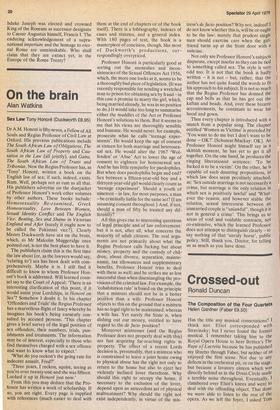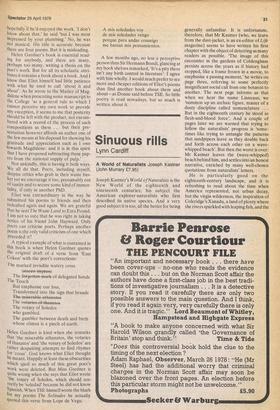Crossed-out
Ronald Duncan
The Composition of the Four Quartets Helen Gardner (Faber E9.50)
Has the title any musical connotations? I think not. Eliot corresponded with Stravinsky; but I never found the former musical. I remember taking him to the Royal Opera House to hear Britten's The Rape of Lucretia because he has published my libretto through Faber, but neither of us enjoyed the first scene. Not due to any defects in the orchestral pit, or on the stage, but because a lavatory cistern which was directly behind us in the Dress Circle made a terrible noise throughout. Eventually, I clambered over Eliot's knees and went to deal with the offending object. That done we were able to listen to the rest of the opera. As we left the foyer, I asked Tom hopefully-if he'd enjoyed the work. don't know about that,' he said 'but I was most impressed by your plumbing.' No, he was not musical. His title is accurate because there are four poems. But it is misleading.
Helen Gardner's book is essential reading for anybody, and there are many, Perhaps too many, writing a thesis on the Poet's work. But for all its scholastic attributes it remains a book about a book. And I know that Eliot himself had little patience With what he used to call 'about it and about'. As he wrote to the Mater of Magdalene when presenting some manuscript to the College 'as a general rule to which I cannot perceive my own work to provide any exception, it seems to me that posterity should be left with the product, not encumbered with a record of the process of such compositions as these . . . but their presentation however affords an author one of the few means at his disposal for showing his gratitude and appreciation such as I owe towards Magdalene: and it is in this spirit that I have proposed subtracting these papers from the national supply of pulp.'
Not unkindly, this is having it both ways. We all do that. Poets, including myself, despise critics who grub in their waste basket yet we encourage it too, presumably out of vanity and to secure some kind of immortality, if only in another PhD.
Eliot was extraordinary in the way he submitted his poems to friends and then redrafted again and again. We are grateful that he sent The Waste Land to Ezra Pound.
am not so sure that he was right in taking notice of his friend John Hayward. Only Poets can criticise poets. Perhaps another Poem is the only valid criticism of one which Preceded it?
A typical example of what is contained in this book is when Helen Gardner quotes the original draft of a verse from 'East Coken' with the poet's corrections: The marked invisible watery cross
11+160011-iiiiI3FOSS
The fofgottee-mark of delegated hands The Touch But emphasise our loss, Transformed into the sign that brands The-misemble-athafia4es The votafies-ef-thaetttos The votary of Soledos who gambled.
The gambler between death and birth whose climax is a pinch of earth.
Helen Gardner is kind when she remarks that 'the miserable athanatos, the votaries Of thanatos' and 'the votary of Soledos' are rather despairing attempts to find rhymes for 'cross'. God knows what Eliot thought ne meant. Happily at least these obscurities Which spoil so much of this great poet's work were deleted. But Miss Gardner is quite wrong when she says that Eliot wrote the votary of Soledos, which should correctly be `soledad' because he did not know Spanish. When TSE himself wrote the blurb for my poems The Solitudes he actually quoted this verse from Lope de Vega:
A mis soledades voy de mis soledades vengo porque para andar conmigo me bastan mis pensamientos.
A few months ago, no less a perceptive person than Sir Hermann Bondi, glancing at my book shelves remarked, 'It's a pity there isn't any birth control in literature'. I agree with him wholly. I would much prefer to see more and cheaper editions of Eliot's poems than find another book about them and about — as Donne said before TSE. So little poetry is read nowadays, but so much is written about it.



































 Previous page
Previous page